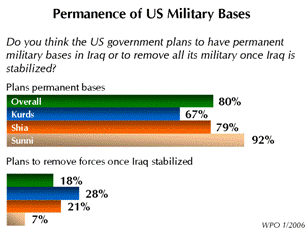
I came across this World Public Opinion Poll story that I thought was very interesting. It appears that the Iraqis don't want the U.S. forces occupying their country, and that they approve of the attacks on our troops. It is a fascinating read:
A new poll of the Iraqi public finds that a large majority of Iraqis think the US plans to maintain bases in Iraq permanently, even if the newly elected government asks the US to leave. A large majority favors setting a timeline for the withdrawal of US forces, though this majority divides over whether the timeline should be over a period of six months or two years. Nearly half of Iraqis approve of attacks on US-led forces—including nine out of 10 Sunnis. Most Iraqis believe that many aspects of their lives will improve once the US-led forces leave, but are nonetheless uncertain that Iraqi security forces are ready to stand on their own.
The poll was conducted for WorldPublicOpinion.org by the Program on International Policy Attitudes (PIPA) at the University of Maryland and was fielded by KA Research Limited/D3 Systems, Inc. Polling was conducted January 2-5 with a nationwide sample of 1,150, which included an oversample of 150 Arab Sunnis (hereafter simply called Sunnis).
Asked whether “the US government plans to have permanent military bases in Iraq or to remove all its military forces once Iraq is stabilized,” 80% overall assume that the US plans to remain permanently, including 79% of Shia, 92% of Sunnis and 67% of Kurds. Only small minorities believe that the US plans “to remove all its military forces once Iraq is stabilized” (overall 18%, Shia 21%, Sunni 7%, Kurds 28%).
Iraqis of all ethnic groups also agree that the US is unlikely to take direction from the Iraqi government. Asked what they think the US would do if the new government were to ask the US to withdraw its forces within six months, 76% overall assume that the US would refuse to do so (Shia 67%, Sunni 94%, Kurds 77%).
Now I don't know how accurate these poll numbers are, but I will say that they do provide some interesting trends regarding the Iraqi public's perception of the war--especially with the breakdown according to ethnicity and religion. The majority of the Iraqi population generally agrees that the U.S. is establishing permanent bases there, and believes that the U.S. would not withdrawal from those bases. The Iraqis do have a desire for their government to ask for a U.S. withdrawal, however the differences in the actual timetable for a withdrawal shows sharp divisions in the ethnic and religious groups, with the Sunnis favoring a U.S. withdrawal in less than six months, while the Shia and Kurds favor a longer timetable of over two years.
Now here is some really interesting poll numbers:
Respondents were asked what would happen in a variety of areas if US-led forces were to withdraw from Iraq in the next six months. Majorities of Iraqis express confidence that in many dimensions related to security, things would improve. Sixty-seven percent say that “day to day security for ordinary Iraqis” would increase, a consensus position among all ethnic groups—83% of Sunnis, 61% of Shia and 57% of Kurds. On other points, Sunnis and Shia agree, but the Kurds diverge. Overall, 64% believe that violent attacks would decrease, including a majority of Sunnis (86%) and Shia (66%), but 78% of Kurds think they will increase. Overall, 61% think that the amount of interethnic violence will decrease, including a majority of Sunnis (81%) and Shia (64%), but a majority of Kurds (68%) think it will increase. Similarly, 56% overall agree that the presence of foreign fighters in Iraq will decrease if US-led forces withdraw (Sunnis 74%, Shia 64%), but 74% of Kurds think they will increase.
Interestingly, there is a fair amount of consensus that if US-led troops were to withdraw, there would be substantial improvement in the performance of the Iraqi state. Overall, 73% think there will be an increase in the willingness of factions to cooperate in Parliament, including majorities of Kurds (62%), Sunnis (87%) and Shia (68%). Sixty-seven percent assume there will be an increase in the availability of public services such as electricity, schools and sanitation (Sunni 83%, Shia 63%, Kurds 54%). Sixty-four percent assume crime will go down (Sunnis 88%, Shia 66%), but here again the Kurds diverge, with 77% assuming crime will increase.
A majority of the Iraqis believe that the security conditions would improve if the U.S. withdrawals. And it is not just the security conditions in Iraq that would improve, but also the performance of the Iraqi state, and public services. It is almost like the U.S. occupation is hampering the Iraqis, forcing ordinary Iraqi citizens to participate in the insurgency against the U.S. occupation, rather than pursuing their own economic self-interests. There is some divergence here with the Kurds. The Kurds believe that the security situation will decrease if the U.S. withdrawals in the next six months, crime and interethnic violence will increase and that foreign fighters will stay in Iraq. I would say that the Kurds are fearful that a quick U.S. withdrawal would force a Shia-controlled Iraqi government to encroach upon their autonomous region in northern Iraq. The Kurds want their own country--their own homeland. While the Kurds may not want an indefinite U.S. presence in Iraq, they want the U.S. to stay long enough so that the Kurds can establish their own governing region, strengthen their own militia, and take control of their own economic resources so that they can create and protect their own homeland, once U.S. forces withdrawal. It is interesting that the majority of the Kurds believe that interethinic violence will increase, while the Sunnis and Shia believe that the interethnic violence will decrease. This divergence of opinion makes me wonder if the Kurds believe that a Shia-Sunni government would try to force their control on the Kurdish regions.
There is one positive point here. "Overall, 73% think there will be an increase in the willingness of factions to cooperate in Parliament, including majorities of Kurds (62%), Sunnis (87%) and Shia (68%)." A majority of all three ethnic groups believe that cooperation between the groups would improve in Parliament if the U.S. establishes a timetable for a withdrawal. A timetable is finite. It would mean that on a certain date, the U.S. would pull its forces out of Iraq, leaving Iraq to the Iraqis. It would mean that the three ethnic groups would have to find some way to cooperate with each other in governing Iraq before the U.S. forces leave. Otherwise, Iraq would degenerate into a civil war. The Iraqi population believes that cooperation is possible between the ethnic groups. Here I would have to wonder if the Iraqi population (of all three ethnic groups) could exert pressure on their own ethnic leaders to ensure their cooperation. As long as the U.S. remains in Iraq indefinitely, that will never happen. Perhaps it is time to explore new course changes in our Iraq policy and the war.

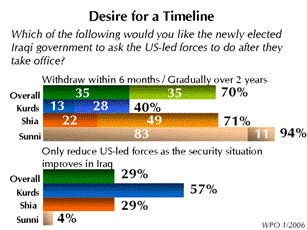
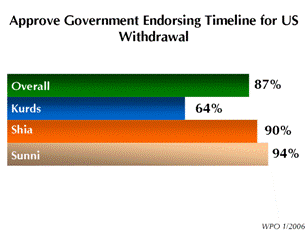
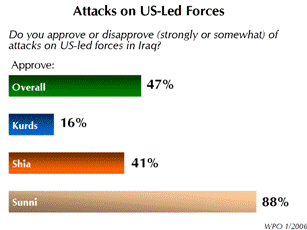

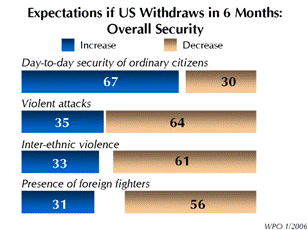

No comments:
Post a Comment